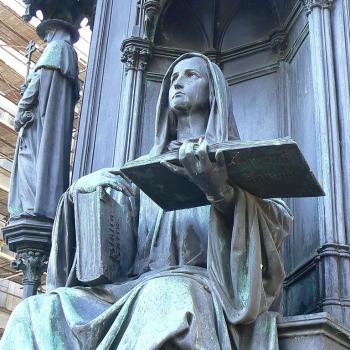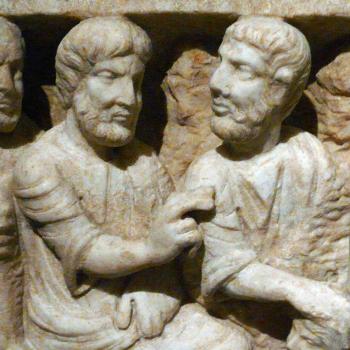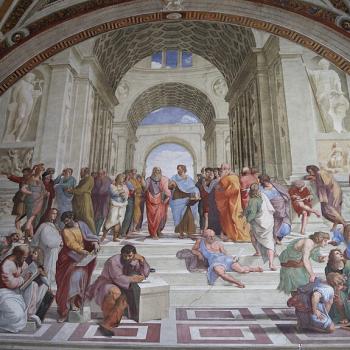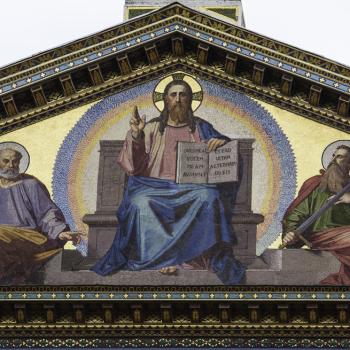
Christian doctrine, and the tradition in which it is found, is important, but we must engage it honestly. We must come to recognize and accept that tradition has developed over time. It is constantly changing, indeed, it can be said to be evolving, as the people who hand down what they have been given to another generation add their own views, their own opinions, their own ideologies, their own errors and mistakes, as well as their own innovations and new insights, to those who come after them. This means, when we look to what is contained in tradition, we will find a variety of thought, sometimes coming from people who hold vastly different opinions from each other.
Those who do not study patristics often think the Church Fathers (and Mothers) present one, consistent teaching amongst them, with no conflicts, with no deviation from each other. That is, many hold the naïve view that patristic authors present a simple, unified tradition which we should take in and accept without critical analysis, so that we can hand down pure doctrine to the next generation. Those who study patristics know this is false; they know there were all kinds of conflicts between those who handed down tradition to us, that even those who are known to be saintly Doctors of the Church often fought against each other, sometimes with malice, in order to promote their particular views against all those who held something different. St. Jerome is a prime example of the way patristic authors can be seen fighting against anyone and everyone who, including other saints: not only did he turn against his close friend, Rufinus, he was known to warn St. Augustine not to challenge him and his authority when Augustine had issues with Jerome (such as with Jerome’s translation of Scripture into Latin). Similarly, St. Augustine, and those who followed his theological opinion, were often in conflict with those who held to a more Eastern Christian spirituality, such as St. John Cassian (and those who followed after Cassian), fearing that such a spirituality was tainted by Pelagian thought. Thankfully, the Benedictine tradition in the West mediated between Augustine and the Eastern tradition, as they took in Cassian and Cassian’s contributions, integrating his monastic spirituality, with the advances made in Augustine’s theology, which made sure that the West did not entirely lose sight of Eastern spiritualty, even though it would still misunderstand it from time to time.
It is important for us to recognize the real discord which can be found in Christian tradition, even in its earliest stages, found in patristic literature so we do not end up creating an idol out of either, which easily happens when think there is one single underlying tradition, easy to discern, found throughout patristics (and later Christian history). For, as Nikolaos Loudovikos explained, if we do not recognize the conflict and the changes which happen over time, it becomes extremely difficult for us to engage theological reflection today, as those who would do so would end up thinking they cannot go beyond a falsely-perceived norm:
They almost feel guilty when a critical filtering of the written ecclesiastical tradition is required of them. They identify the holiness of the Fathers with the holiness, omniscience, and fullness of God Himself, and essentially idolize them, becoming unable to discern the “treasure in earth vessels” (2 Cor. 4.7). The fact that the Fathers are saints – and they really are saints! – does not mean that they do not complement and correct each other, that they do not have human failings or – on account of such failings – human faults and one-sidedness, as Abba Barsanouphios observed (Barsanouphios and John, Questions and Answers 604). Treating the Fathers, or Christian Hellenism, as idols, instead of engaging them in a living and crucially existential manner, leads to an equally dangerous pit for contemporary theology as was the centuries-long ignorance of them. [1]
The Church Fathers (and the few Mothers whose thought we possess, like St. Macrina) certainly have much to teach us, but we must recognize the context in which they wrote, and the limitations that context placed upon them. There was much which they did not know about the world they lived in which we have only discovered recently, some of which should influence our own theological reflections (such as the discovery of evolution). Theological development is not only possible, it is necessary, to deal with new questions when they arise. Adaptation requires us to understand the many branches of tradition, to understand how and why various schools of theological thought were established. Doing so will allow us to critically engage tradition, to discern what of it can be and should continue to be upheld, and what elements might need to be changed or even excised, as we come across questions which previous generations should not even ask.
Thus, with tradition, there is a way in which those who lived before us continue to influence the world, and so have a sense of life, even as we find in Christ, they continue to live (though in a new modality of living). Accepting this, we still must understand what they have left with us are historical documents. We cannot interact with them as if they are our contemporaries. Sergius Bulgakov is right in saying, yes, they still live, and we have a way to interact with them, but we must not confuse that interaction as being the same kind we have with those who experience temporal existence with us:
I did not say that they had died, everything really alive never dies, and they are living with us and teaching us and our thinkers, but they are just no longer our contemporaries, we must translate their thoughts into our language, they do not assuage our pains, and they appear before us not only in their spiritual might, but also in their historical limitations. [2]
This is why it is dangerous to look to and engage tradition as simply restating what was said in the past, making sure nothing changes over time. Not only is it impossible for there to be no change, we should recognize, so long as there is life, we should hope for and expect change. Christianity has constantly been changing, developing over time, sometimes for the good (as can be seen in the repudiation of slavery), but sadly, sometimes, in ways which can be seen as for the worse (as, for example, we find in the development of Christian nationalism). Those who try use tradition in a legalistic, rigoristic fashion, especially if they only engage one branch of tradition to arbitrarily represent all tradition (such as some Thomists do with Aquinas), diminish Christianity and often become a source of extreme discord (even as it often serves as the foundation for an authoritarian traditionalism which undermines the work of the Spirit in tradition). Such a traditionalism undermines our own personal agency, our ability to engage the questions which touch us at the core of our being, because it suggests all major questions have authoritatively been answered; this is not what tradition should be used for, and that is why, when tradition is presented, it must always be presented with proper historical awareness, so we will truly understand our connection with tradition and our ability to develop it as we pass it on to the next generation because we will see those who we look up to and learn from did that in their own day.
[1] Nikolaos Loudovikos, Church In the Making: An Apophatic Ecclesiology of Consubstantiality. Trans. Normal Russell (Crestwood, NY: St Vladimir’s Seminary Press, 2016), 12.
[2] Sergius Bulgakov, By the Walls of Chersonesus. Trans. Mike Whitton (No City Listed: Independent Publication, 2024), 29.
Stay in touch! Like A Little Bit of Nothing on Facebook.
If you liked what you read, please consider sharing it with your friends and family!
N.B.: While I read comments to moderate them, I rarely respond to them. If I don’t respond to your comment directly, don’t assume I am unthankful for it. I appreciate it. But I want readers to feel free to ask questions, and hopefully, dialogue with each other. I have shared what I wanted to say, though some responses will get a brief reply by me, or, if I find it interesting and something I can engage fully, as the foundation for another post. I have had many posts inspired or improved upon thanks to my readers.













